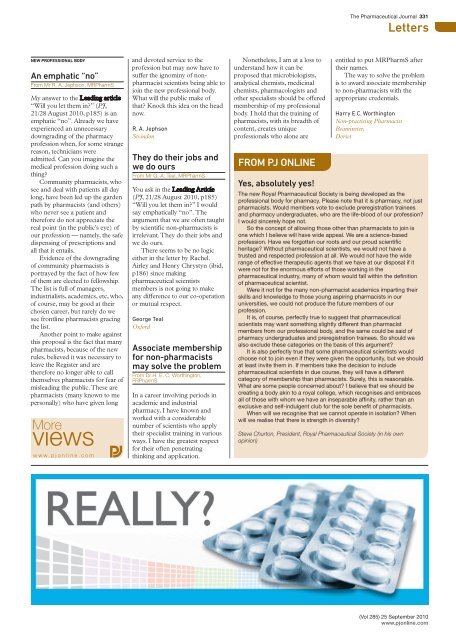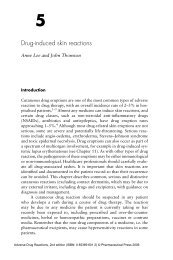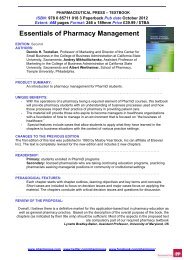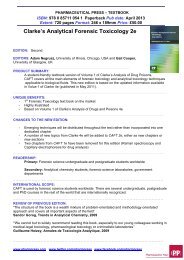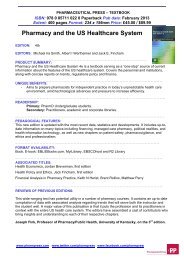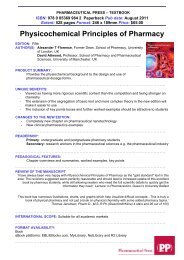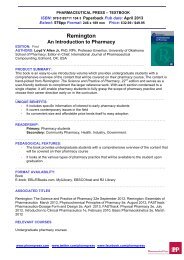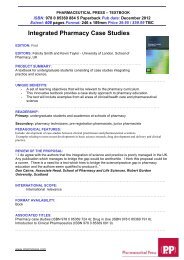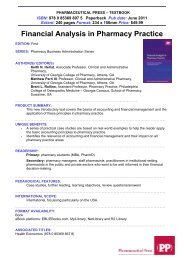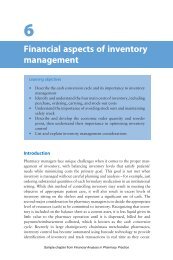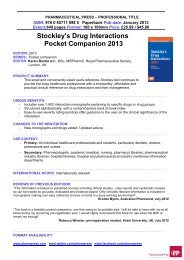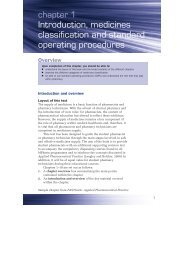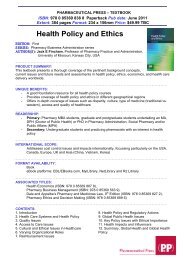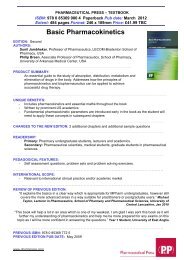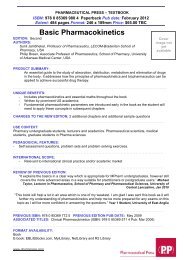How to deal with military prescriptions - Pharmaceutical Press
How to deal with military prescriptions - Pharmaceutical Press
How to deal with military prescriptions - Pharmaceutical Press
Create successful ePaper yourself
Turn your PDF publications into a flip-book with our unique Google optimized e-Paper software.
The <strong>Pharmaceutical</strong> Journal 331<br />
Letters<br />
NEW PROFESSIONAL BODY<br />
An emphatic “no”<br />
From Mr R. A. Jephson, MRPharmS<br />
My answer <strong>to</strong> the Leading article<br />
“Will you let them in?” (PJ,<br />
21/28 August 2010, p185) is an<br />
emphatic “no”. Already we have<br />
experienced an unnecessary<br />
downgrading of the pharmacy<br />
profession when, for some strange<br />
reason, technicians were<br />
admitted. Can you imagine the<br />
medical profession doing such a<br />
thing?<br />
Community pharmacists, who<br />
see and <strong>deal</strong> <strong>with</strong> patients all day<br />
long, have been led up the garden<br />
path by pharmacists (and others)<br />
who never see a patient and<br />
therefore do not appreciate the<br />
real point (in the public’s eye) of<br />
our profession — namely, the safe<br />
dispensing of <strong>prescriptions</strong> and<br />
all that it entails.<br />
Evidence of the downgrading<br />
of community pharmacists is<br />
portrayed by the fact of how few<br />
of them are elected <strong>to</strong> fellowship.<br />
The list is full of managers,<br />
industrialists, academics, etc, who,<br />
of course, may be good at their<br />
chosen career, but rarely do we<br />
see frontline pharmacists gracing<br />
the list.<br />
Another point <strong>to</strong> make against<br />
this proposal is the fact that many<br />
pharmacists, because of the new<br />
rules, believed it was necessary <strong>to</strong><br />
leave the Register and are<br />
therefore no longer able <strong>to</strong> call<br />
themselves pharmacists for fear of<br />
misleading the public. These are<br />
pharmacists (many known <strong>to</strong> me<br />
personally) who have given long<br />
www.pjonline.com<br />
and devoted service <strong>to</strong> the<br />
profession but may now have <strong>to</strong><br />
suffer the ignominy of nonpharmacist<br />
scientists being able <strong>to</strong><br />
join the new professional body.<br />
What will the public make of<br />
that? Knock this idea on the head<br />
now.<br />
R. A. Jephson<br />
Swindon<br />
They do their jobs and<br />
we do ours<br />
From Mr G. A. Teal, MRPharmS<br />
You ask in the Leading Article<br />
(PJ, 21/28 August 2010, p185)<br />
“Will you let them in?” I would<br />
say emphatically “no”. The<br />
argument that we are often taught<br />
by scientific non-pharmacists is<br />
irrelevant. They do their jobs and<br />
we do ours.<br />
There seems <strong>to</strong> be no logic<br />
either in the letter by Rachel.<br />
Airley and Henry Chrystyn (ibid,<br />
p186) since making<br />
pharmaceutical scientists<br />
members is not going <strong>to</strong> make<br />
any difference <strong>to</strong> our co-operation<br />
or mutual respect.<br />
George Teal<br />
Oxford<br />
Associate membership<br />
for non-pharmacists<br />
may solve the problem<br />
From Dr H. E. C. Worthing<strong>to</strong>n,<br />
FRPharmS<br />
In a career involving periods in<br />
academic and industrial<br />
pharmacy, I have known and<br />
worked <strong>with</strong> a considerable<br />
number of scientists who apply<br />
their specialist training in various<br />
ways. I have the greatest respect<br />
for their often penetrating<br />
thinking and application.<br />
Nonetheless, I am at a loss <strong>to</strong><br />
understand how it can be<br />
proposed that microbiologists,<br />
analytical chemists, medicinal<br />
chemists, pharmacologists and<br />
other specialists should be offered<br />
membership of my professional<br />
body. I hold that the training of<br />
pharmacists, <strong>with</strong> its breadth of<br />
content, creates unique<br />
professionals who alone are<br />
FROM PJ ONLINE<br />
Yes, absolutely yes!<br />
entitled <strong>to</strong> put MRPharmS after<br />
their names.<br />
The way <strong>to</strong> solve the problem<br />
is <strong>to</strong> award associate membership<br />
<strong>to</strong> non-pharmacists <strong>with</strong> the<br />
appropriate credentials.<br />
Harry E.C. Worthing<strong>to</strong>n<br />
Non-practising Pharmacist<br />
Beaminster,<br />
Dorset<br />
The new Royal <strong>Pharmaceutical</strong> Society is being developed as the<br />
professional body for pharmacy. Please note that it is pharmacy, not just<br />
pharmacists. Would members vote <strong>to</strong> exclude preregistration trainees<br />
and pharmacy undergraduates, who are the life-blood of our profession?<br />
I would sincerely hope not.<br />
So the concept of allowing those other than pharmacists <strong>to</strong> join is<br />
one which I believe will have wide appeal. We are a science-based<br />
profession. Have we forgotten our roots and our proud scientific<br />
heritage? Without pharmaceutical scientists, we would not have a<br />
trusted and respected profession at all. We would not have the wide<br />
range of effective therapeutic agents that we have at our disposal if it<br />
were not for the enormous efforts of those working in the<br />
pharmaceutical industry, many of whom would fall <strong>with</strong>in the definition<br />
of pharmaceutical scientist.<br />
Were it not for the many non-pharmacist academics imparting their<br />
skills and knowledge <strong>to</strong> those young aspiring pharmacists in our<br />
universities, we could not produce the future members of our<br />
profession.<br />
It is, of course, perfectly true <strong>to</strong> suggest that pharmaceutical<br />
scientists may want something slightly different than pharmacist<br />
members from our professional body, and the same could be said of<br />
pharmacy undergraduates and preregistration trainees. So should we<br />
also exclude these categories on the basis of this argument?<br />
It is also perfectly true that some pharmaceutical scientists would<br />
choose not <strong>to</strong> join even if they were given the opportunity, but we should<br />
at least invite them in. If members take the decision <strong>to</strong> include<br />
pharmaceutical scientists in due course, they will have a different<br />
category of membership than pharmacists. Surely, this is reasonable.<br />
What are some people concerned about? I believe that we should be<br />
creating a body akin <strong>to</strong> a royal college, which recognises and embraces<br />
all of those <strong>with</strong> whom we have an inseparable affinity, rather than an<br />
exclusive and self-indulgent club for the sole benefit of pharmacists.<br />
When will we recognise that we cannot operate in isolation? When<br />
will we realise that there is strength in diversity?<br />
Steve Chur<strong>to</strong>n, President, Royal <strong>Pharmaceutical</strong> Society (in his own<br />
opinion)<br />
(Vol 285) 25 September 2010<br />
www.pjonline.com


